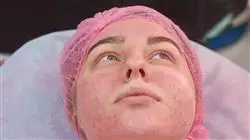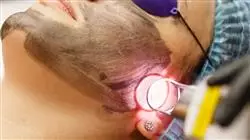University certificate
The world's largest faculty of medicine”
Introduction to the Program
With this 100% online program, you will master the most innovative techniques of Integrative Aesthetic Medicine and create personalized intervention plans that will improve the overall well-being of patients”

A new report by the World Health Organization shows that more than 20 million non-surgical cosmetic procedures were performed globally last year. At the same time, the institution highlights that there has been a notable increase in body image disorders. This fact underlines the need for medical approaches that integrate both aesthetic and psychological aspects, in order to ensure an improvement in the overall well-being of individuals in the long term. In this context, experts require a solid understanding of the fundamentals of Integrative Aesthetic Medicine in order to develop strategies that maximize therapeutic results and minimize the potential risks associated with interventions.
In this scenario, TECH has created a pioneering program in Integrative Aesthetic Medicine. Conceived by true referents in this sector, the academic itinerary will delve into subjects ranging from the most effective diagnostic evaluation methods to determine skin aging or the execution of advanced procedures such as dermal fillers to the use of state-of-the-art technologies such as light sources. The syllabus will also provide graduates with the keys to perform minimally invasive therapies, including stem cell therapies. As a result, graduates will develop advanced clinical skills to design and implement individualized therapeutic plans according to the specific requirements of each patient. Thanks to this, they will optimize the quality of life of individuals in the long term.
In addition, this university program is based on TECH's unique Relearning system, which guarantees that professionals will enjoy an immersive experience, where they will progressively update their knowledge. All they will need is an electronic device with an Internet connection to immerse themselves in the Virtual Campus, where they will find a variety of multimedia support resources such as interactive summaries or explanatory videos. In addition, a renowned International Guest Director will give a series of unique Masterclasses.
A prestigious International Guest Director will offer exclusive Masterclasses that will delve into the latest trends in Integrative Aesthetic Medicine”
This Advanced master’s degree in Integrative Aesthetic Medicine contains the most complete and up-to-date scientific program on the market. Its most notable features are:
- The development of practical cases presented by experts in Integrative Aesthetic Medicine
- The graphic, schematic, and practical contents with which they are created, provide scientific and practical information on the disciplines that are essential for professional practice
- Practical exercises where the self-assessment process can be carried out to improve learning
- Special emphasis on innovative methodologies in Integrative Aesthetic Medicine
- Theoretical lessons, questions to the expert, debate forums on controversial topics, and individual reflection assignments
- Content that is accessible from any fixed or portable device with an Internet connection
You will delve into a variety of Marketing and Communication strategies that will increase the visibility of aesthetic services in the community”
It includes in its teaching staff professionals belonging to the field of Integral Aesthetic Medicine, who pour into this program the experience of their work, in addition to recognized specialists from reference societies and prestigious universities.
The multimedia content, developed with the latest educational technology, will provide the professional with situated and contextual learning, i.e., a simulated environment that will provide an immersive learning experience designed to prepare for real-life situations.
This program is designed around Problem-Based Learning, whereby the student must try to solve the different professional practice situations that arise throughout the program. For this purpose, the professional will be assisted by an innovative interactive video system created by renowned and experienced experts.
You will diagnose early various scalp pathologies such as Alopecia, Seborrheic Dermatitis and Fungal Infections"

The innovative Relearning method powered by TECH will allow you to update your knowledge without depending on external teaching conditions"
Why study at TECH?
TECH is the world’s largest online university. With an impressive catalog of more than 14,000 university programs available in 11 languages, it is positioned as a leader in employability, with a 99% job placement rate. In addition, it relies on an enormous faculty of more than 6,000 professors of the highest international renown.

Study at the world's largest online university and guarantee your professional success. The future starts at TECH”
The world’s best online university according to FORBES
The prestigious Forbes magazine, specialized in business and finance, has highlighted TECH as “the world's best online university” This is what they have recently stated in an article in their digital edition in which they echo the success story of this institution, “thanks to the academic offer it provides, the selection of its teaching staff, and an innovative learning method aimed at educating the professionals of the future”
A revolutionary study method, a cutting-edge faculty and a practical focus: the key to TECH's success.
The most complete study plans on the university scene
TECH offers the most complete study plans on the university scene, with syllabuses that cover fundamental concepts and, at the same time, the main scientific advances in their specific scientific areas. In addition, these programs are continuously being updated to guarantee students the academic vanguard and the most in-demand professional skills. In this way, the university's qualifications provide its graduates with a significant advantage to propel their careers to success.
TECH offers the most comprehensive and intensive study plans on the current university scene.
A world-class teaching staff
TECH's teaching staff is made up of more than 6,000 professors with the highest international recognition. Professors, researchers and top executives of multinational companies, including Isaiah Covington, performance coach of the Boston Celtics; Magda Romanska, principal investigator at Harvard MetaLAB; Ignacio Wistumba, chairman of the department of translational molecular pathology at MD Anderson Cancer Center; and D.W. Pine, creative director of TIME magazine, among others.
Internationally renowned experts, specialized in different branches of Health, Technology, Communication and Business, form part of the TECH faculty.
A unique learning method
TECH is the first university to use Relearning in all its programs. It is the best online learning methodology, accredited with international teaching quality certifications, provided by prestigious educational agencies. In addition, this disruptive educational model is complemented with the “Case Method”, thereby setting up a unique online teaching strategy. Innovative teaching resources are also implemented, including detailed videos, infographics and interactive summaries.
TECH combines Relearning and the Case Method in all its university programs to guarantee excellent theoretical and practical learning, studying whenever and wherever you want.
The world's largest online university
TECH is the world’s largest online university. We are the largest educational institution, with the best and widest online educational catalog, one hundred percent online and covering the vast majority of areas of knowledge. We offer a large selection of our own degrees and accredited online undergraduate and postgraduate degrees. In total, more than 14,000 university degrees, in eleven different languages, make us the largest educational largest in the world.
TECH has the world's most extensive catalog of academic and official programs, available in more than 11 languages.
Google Premier Partner
The American technology giant has awarded TECH the Google Google Premier Partner badge. This award, which is only available to 3% of the world's companies, highlights the efficient, flexible and tailored experience that this university provides to students. The recognition as a Google Premier Partner not only accredits the maximum rigor, performance and investment in TECH's digital infrastructures, but also places this university as one of the world's leading technology companies.
Google has positioned TECH in the top 3% of the world's most important technology companies by awarding it its Google Premier Partner badge.
The official online university of the NBA
TECH is the official online university of the NBA. Thanks to our agreement with the biggest league in basketball, we offer our students exclusive university programs, as well as a wide variety of educational resources focused on the business of the league and other areas of the sports industry. Each program is made up of a uniquely designed syllabus and features exceptional guest hosts: professionals with a distinguished sports background who will offer their expertise on the most relevant topics.
TECH has been selected by the NBA, the world's top basketball league, as its official online university.
The top-rated university by its students
Students have positioned TECH as the world's top-rated university on the main review websites, with a highest rating of 4.9 out of 5, obtained from more than 1,000 reviews. These results consolidate TECH as the benchmark university institution at an international level, reflecting the excellence and positive impact of its educational model.” reflecting the excellence and positive impact of its educational model.”
TECH is the world’s top-rated university by its students.
Leaders in employability
TECH has managed to become the leading university in employability. 99% of its students obtain jobs in the academic field they have studied, within one year of completing any of the university's programs. A similar number achieve immediate career enhancement. All this thanks to a study methodology that bases its effectiveness on the acquisition of practical skills, which are absolutely necessary for professional development.
99% of TECH graduates find a job within a year of completing their studies.
Advanced Master's Degree in Integrative Aesthetic Medicine
In recent years, the number of patients seeking treatments that improve their appearance or allow the rehabilitation of a present condition has increased thanks to the evolution of methods and technological instruments used in the field of aesthetic medicine in order to provide greater security and guarantees. With the purpose of improving the qualification of professionals in the sector, at TECH Global University we developed the Advanced Master's Degree in Integrative Aesthetic Medicine, a program focused on addressing the main concepts and topics of this discipline so that you can specialize and apply the latest techniques and strategies developed.
Specialize in the largest School of Medicine
Through a postgraduate program taught in a 100% online format, you will learn the approach and the mechanisms of intervention of the Integral Aesthetic Medicine. From this, you will know how to make a proper clinical diagnosis, supported by the best technologies; you will master the materials and tools necessary to carry out temporary or permanent procedures; and you will have a broad knowledge of the different therapeutic options available for the treatment of topical disorders such as acne. In this way, you will learn to develop the most innovative techniques for each anatomical area involved and you will offer higher quality and safer results. With our Advanced Master's Degree, you will stand out as an expert in the practice of this discipline and you will become a key player in today's job market.







